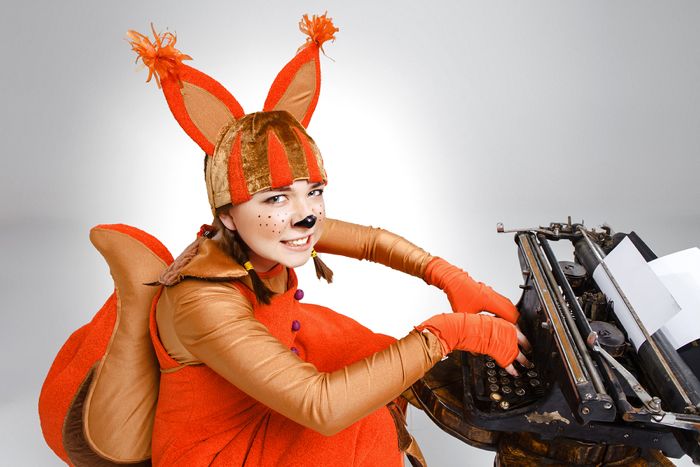Do you dress up for Halloween?
If not, do you dress up at any other time? Do you go all out for an awards dinner, for example, dress up to give a presentation, or even dress up like one of your characters to get into his or her head?
I spent a few years teaching kindergarten, and I remember the fun I used to have dressing up to share a few laughs with my students. I found that wearing a mask and some freaky hair naturally led to play acting, and that always filled the classroom with energy and enthusiasm.
Writers kind of have a reputation, however, for dressing down. We like sweats and slippers or jeans and t-shirts, and rarely spiff up even for an author photo. With Halloween upon us, though, I want to encourage you to dress up more often, in your goofy outfits, your scary outfits, your glamour outfits, and your knock-em-dead outfits.
Why?
Because it’s fun, and also because it increases creativity, boosts confidence, and actually rewires your brain for success!
 1. Dressing Up Makes You More Creative
1. Dressing Up Makes You More Creative
You may feel more creative when you put on your Halloween costume, or even when you don a particularly colorful outfit or out-of-the norm style. But scientists say that even when you dress up in your best clothes, you’re more likely to be able to think outside of the box.
Researchers reviewed the results of five different studies, and found that wearing more “formal” clothing (such as what you’d wear to the office) was associated with broader thinking, to the point that it changed the processing style to a more abstract, holistic, creative style of cognition.
This sort of thinking is associated with long-term vision as opposed to short-term gains—which could have definite benefits for a writer or other creative artist. Subjects who dressed more casually were more likely to express more limited thinking patterns.
In one of the five studies reviewed, researchers had participants fill out a questionnaire asking them to place things into categories, and then compared those who dressed more formally to those who dressed more casually. The students who dressed up were more likely to think more abstractly and to give out-of-the-box answers, while those in casual clothes answered in more concrete terms.
Researchers theorized this could be partly because dressing up makes us feel more powerful and confident—like managers and CEOs might feel—and we therefore slip naturally into a more visionary type of thinking.
“The formality of clothing might not only influence the way others perceive a person, and how people perceive themselves,” said lead author Abraham M. Rutchick, a psychologist at California State University, Northridge, “but could influence decision making in important ways through its influence on processing style.”
 2. Dressing Up Helps You Focus
2. Dressing Up Helps You Focus
Could putting on a dressy jacket make it easier to focus on the next scene in your story? It’s possible.
In a 2012 study, researchers had some subjects wear a lab coat, while others didn’t, and found that the lab coat increased selective attention. In two other related experiments, wearing the lab coat, when it was described as a “doctor’s coat,” increased the amount of time that subjects were able to focus on a task. Wearing the same coat described as a “painter’s coat,” on the other hand, did not result in the same increases in attention and focus.
Researchers concluded that while it depends on both the symbolic meaning and the physical experience of wearing certain clothes, clothing can definitely increase attention.
This is great news is a world that is so distracted. If you’re having trouble avoiding the Internet or Facebook while you’re writing, the solution may be as simple as putting on a dress jacket to improve your concentration!
 3. Dressing Up May Boost Your Productivity
3. Dressing Up May Boost Your Productivity
Want to get more done so you have more time to write? Then dress for it!
Though there seems to be no literature showing that formal dress increases productivity, we do have research showing that what you wear affects how you think—and that, in turn, affects how productive you are.
“What you are wearing doesn’t influence your productivity,” Andrew Brown, group communications director at Regus, told Fast Company, “but the state of mind that it puts you in does….You will not be productive if all day you’re rearranging your clothing or breathing in to fit into those skinny jeans.”
Chris Bailey, writing on his blog Life of Productivity, describes his own experiments with clothing and productivity:
“Over the last three weeks or so, I alternated between dressing formal, business casual, and in pajamas in an effort to explore how what I wore affected my productivity. Every waking hour of the experiment I measured my energy, motivation, and ability to focus, all out of 10.”
He also tried to limit his ingestion of caffeine and alcohol, made sure to get enough sleep, and relaxed on the weekends, to limit other influences on his productivity.
He found that when he needed to talk to other people, dressing up made him feel more confident, which in turn, made him more productive. When he wanted to write as much as possible, however, the standard sweat pants and shirt were the better choice.
“To use clothes to become more productive,” he says, “start by defining what you want to accomplish. Then work backward to what mindset you’ll need to get there, and then pick the outfit that will create that mindset for you.”
 4. Dressing Up Helps You Appear More Knowledgeable
4. Dressing Up Helps You Appear More Knowledgeable
If you’re going to do a book signing or give a presentation, don’t skimp on your outfit. Studies show that the right clothes can affect how others perceive you.
In a 2002 study for example, researchers found that students rated more casually dressed professors as more approachable, but not as knowledgeable as those who dressed more formally. In a follow-up study, other researchers found similar results, and also discovered that more casually dressed teachers elicited ratings of less respect than more formally dressed ones.
Indeed, though we often imagine an ideal world where we ignore clothing when judging a person, it remains a fact that most human beings just can’t help it. “Clothing strongly affects how you are perceived,” Dr. Pradeep Thapar, psychiatrist on staff at Advocate Christ Medical Center in Oak Lawn, Ill., told ABC News, “which ultimately influences how someone responds to you.”
To give you that extra edge when you’re sharing your work, teaching, reading, or signing, don’t be afraid to dress up. Not only will it help others see you as knowledgeable, it will also help you feel more confident.
 5. Dressing Up Helps You Feel More Confident
5. Dressing Up Helps You Feel More Confident
Have you ever heard of the saying, “dress for the job you want, not the job you have?”
There’s likely something to it, because when you dress up, it affects how you feel. Researchers have found this to be true in a number of studies. In 2014, for example, they had participants dress either in business suits or sweat pants, and then sent them into a negotiation with another participant who was unaware of the clothing set-up.
Those who dressed up came out of the negotiation with more profitable deals than those who dressed down. Researchers concluded it was because they felt more confident and powerful.
You don’t have to go the suit direction to enjoy this effect, though. Professor Karen Pine from the University of Hertfordshire wrote a book entitled Mind What You Wear, and reported that what we wear affects our thinking processes, to the point that even a Superman T-shirt can help us feel stronger.
“Putting on different clothes creates different thoughts and mental processes,” she told the Daily Mail. In her studies, she found that when asked to estimate how much they could lift, those wearing a Superman T-shirt thought they were stronger than those in plain T-shirts.
“When we put on a piece of clothing,” she added, “we cannot help but adopt some of the characteristics associated with it, even if we are unaware of it.”
In Pine’s studies, as in others mentioned above, wearing a white coat improved mental agility. Wearing a sweater also helped women perform better on math tests than when they were wearing swimming suits.
What makes you feel confident? Choose that for your next signing or public speaking event.
“To feel more beautiful, confident, and strong,” Lisa Stariha, The Body Empowerment Coach, told The Huffington Post, “you must change out of the yoga pants and put on clothes that give you power.”
 6. Dressing Up Helps You Take Criticism Less Personally
6. Dressing Up Helps You Take Criticism Less Personally
If you’re headed out to your writing group meeting and you’re expecting a critique on your story, consider dressing up.
It will help you take the comments less personally.
Researchers found this to be true, mainly because formal dress helped individuals to think more abstractly.
“If you get a stinging piece of critical feedback at work,” said study author Rutchick, “if you think about it with a concrete processing style, it’s more likely to negatively impact your self-esteem.” If you’ll recall from the beginning of this post, that “concrete processing style” is more likely in those wearing casual clothes.
More formal clothes, on the other hand, may allow you to take a more distant view of the story itself, and help you see where the flaws are without feeling badly about them.
 7. Nicer Clothing May Make You Feel Better
7. Nicer Clothing May Make You Feel Better
Have you ever put something on simply because it makes you feel good?
On the other hand, have you noticed that when you feel sad or depressed, you’re more likely to wear your old sweats and baggy shirts?
A small survey of about 100 women found that the majority of them (96 percent) believed that what they wore affected how confident they felt. There was such a strong connection between clothing and mood that researchers suggested women choose the clothes they associated with happiness—even when they were feeling low.
“If we knew more about which clothes could lift a person’s mood,” says Pine, “perhaps there’d be less need for anti-depressant medication.”
Just received another rejection or bad review? Instead of heading for the ice cream carton, try putting on one of your favorite outfits. It may help you feel better!
Do you use clothes to enhance your writing progress?
Sources
Michael L. Slepian, et al., “The Cognitive Consequences of Formal Clothing,” Social Psychological and Personality Science, 2015; 6(6):661-666, http://www.columbia.edu/~ms4992/Publications/2015_Slepian-Ferber-Gold-Rutchick_Clothing-Formality_SPPS.pdf.
Cody Delistraty, “Yes, It Matters What You Wear to an Exam,” Nautilus, March 8, 2016, http://nautil.us/blog/yes-it-matters-what-you-wear-to-an-exam.
Hajo Adam, Adam D. Galinsky, “Enclothed cognition,” Psychology, July 2012; 48(4):918-925, http://www.sciencedirect.com/science/article/pii/S0022103112000200.
Bettina Hannover and Ulrich Kuhnen, “’The Clothing Makes the Self,’” Journal of Applied Social Psychology, 2002; 32(12):2513-2525, http://onlinelibrary.wiley.com/doi/10.1111/j.1559-1816.2002.tb02754.x/epdf?referrer_access_token=Ywsrg4LzOKxNdTXiezLXW4ta6bR2k8jH0KrdpFOxC65tJuewymjljMbvTF2qNaurgL95DIgouUcxPE0cIXWUMBnjICS-f2Y-I3Dqs8NFqwB5LcO1mL0ie27bX7jVZEWWu5q-z6y8CzXxcwSHtA_MN4aEX7kg4simma_Lw17ByzsBEwyexXkIaWGEqMJDSQckPk0s-5knesixJb-JP_kTvZU5Af2Om-R_qFdJIVlYrLw42ZkTLZsB8Bkfy5LPvwU3_UVm1eSVSQRderoqsOTsRQ%3D%3D.
Julie Nakis, “Can dressing up make you more creative,” Health eNews, June 2015; http://www.ahchealthenews.com/2015/06/04/can-dressing-up-make-you-more-creative/.
Kraus, M. W., & Mendes, W. B. (2014). Sartorial symbols of social class elicit class-consistent behavioral and physiological responses: A dyadic approach. Journal of Experimental Psychology: General, 143(6), 2330-2340, http://psycnet.apa.org/record/2014-38364-001.
Jonathan O’Callaghan, “You are what you dress: Clothing has a significant effect on self-esteem and confidence, claims expert,” Daily Mail, May 30, 2014, http://www.dailymail.co.uk/sciencetech/article-2644076/You-DRESS-Clothing-significant-effect-self-esteem-confidence-claims-expert.html.
Joe Pinsker, “Wearing a Suit Makes People Think Differently,” Scientific American, April 30, 2015, https://www.theatlantic.com/business/archive/2015/04/wearing-a-suit-makes-people-think-differently/391802/.
Jill L. Ferguson, “How Clothing Choices Affect and Reflect Your Self-Image,” Huffington Post, February 5, 2016, http://www.huffingtonpost.com/jill-l-ferguson/how-clothing-choices-affect-and-reflect-your-self-image_b_9163992.html.
Rheyanne Weaver, “The Link Between Clothing Choices and Emotional States,” Good Therapy, March 30, 2012, https://www.goodtherapy.org/blog/link-between-clothing-choices-and-emotional-states-0330124.
Lydia Dishman, “The Surprising Productivity Secrets hidden in Your Clothes,” Fast Company, February 28, 2014, https://www.fastcompany.com/3026766/the-surprising-productivity-secrets-hidden-in-your-clothes.


I worked in a business climate and enjoyed wearing professional clothing. Once retired, I noticed a definite correlation between productivity and degree of being dressed. After a short period of declining productivity, I made getting out of pajamas immediately, and especially into clothing I enjoy wearing, including jewelry, a priority. Feeling good about how I look is a major key to the day’s success. I don’t need as much clothing now, but always make the extra effort to be well dressed for conferences, readings, and workshops.
You experienced what the studies talked about, Jane. Interesting. Yes, I feel the difference too when taking just a few minutes to wear something that makes me feel good, as you say. Interesting thought on the jewelry! :O)
This post sounds like my mom — she hated the fact I switched to jeans and flannel shirts when I retired from work in the real world and often suggested I dress up more. She fretted about her own clothes and how she looked well into her 90s. It’s hard for me to get excited about clothes, shopping, or even making public appearances when all I really want to do is write another book.
I actually liked going shopping with my mom (still do), but buying clothes for work was kind of a drag. Now that I can wear whatever I want as a writer, it’s fun again!